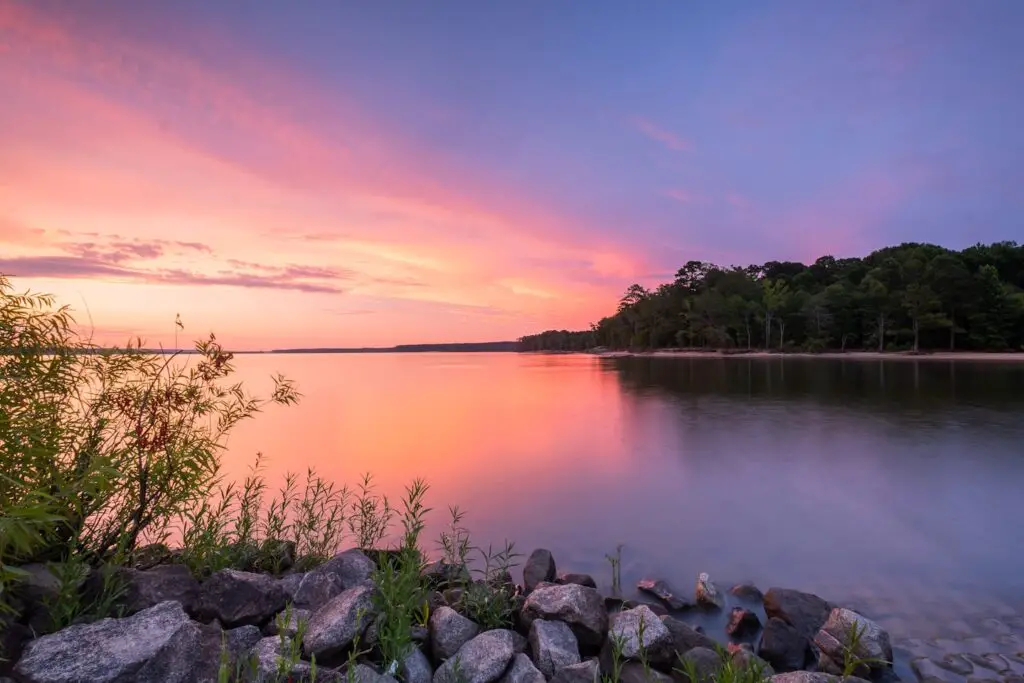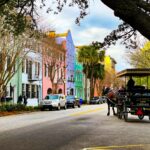North Carolina is a state that offers a little bit of everything: beautiful landscapes, a mild climate, a low cost of living, and excellent educational opportunities. It’s no wonder that many people are considering retiring in this diverse and vibrant state.
Here’s a rundown of the best places in North Carolina to retire based on a comprehensive assessment of key factors such as healthcare, cost of living, and overall well-being, that are important to older adults. See our complete methodology and sources at the end of the article.
Durham: A City of Innovation and Inclusivity
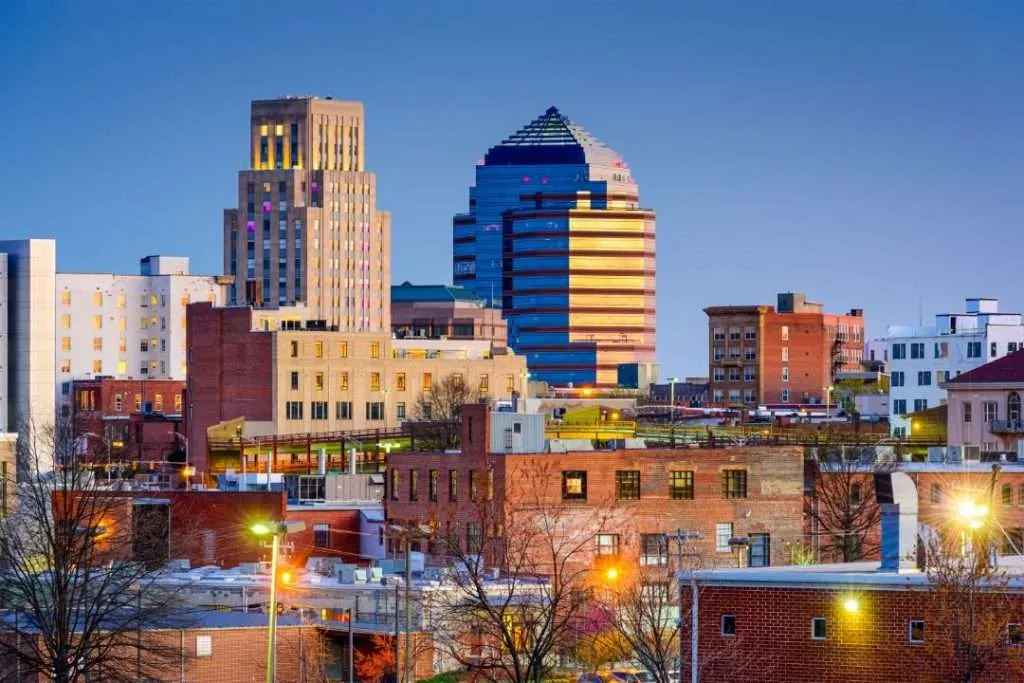
- Population: 291,928
- Percentage of Population 65+: 11.60%
- Cost of Living: B+
- Healthcare: A+
- Wellbeing: A+
Durham is a city that prides itself on innovation, inclusivity, and a rich history. Known as the “City of Medicine,” Durham is home to over 300 outstanding medical facilities, making it an ideal location for retirees who prioritize healthcare. The city is also part of the Research Triangle Park (RTP), a hub for science and technology firms, academic institutions, and startups.
Durham is a city where diversity is celebrated, and is known for its equity, diversity, and inclusiveness. The city is home to Duke University and North Carolina Central University, enriching the community with art museums, performances, talks, and sporting events. Local and international performers, creators, athletes and restaurateurs are showcased at over 5,000 events every year, according to Discover Durham.
If you’re someone who values local businesses and entrepreneurship, Durham is the place for you. The city is known for its high percentage of female business owners and is considered one of the best places to start a business. The Farmers’ Market is open year-round, featuring more than 65 local vendors. This entrepreneurial spirit, combined with a reasonable cost of living and a high quality of life, makes Durham a unique and fantastic place to retire.
Charlotte: The Queen City

- Population: 897,720
- Percentage of Population 65+: 10.2%
- Cost of Living Rating: B-
- Healthcare Rating: A+
- Wellbeing Rating: A+
Charlotte offers a unique blend of Southern charm and urban sophistication that makes it an ideal place for retirees. Known as the “Queen City,” Charlotte was named after Queen Charlotte of Mecklenburg-Strelitz and takes great pride in its historical ties.
The city is a major financial hub, second only to New York City, offering a robust economy and diverse job market. But it’s not all business; the city is also a sports enthusiast’s paradise, hosting professional teams like the Carolina Panthers, Charlotte Hornets, and Charlotte FC. And if you enjoy cars, Charlotte has to be on your bucket list with a Nascar museum and excellent race tracks.
Uptown Charlotte, the city’s central business district, is a vibrant area filled with skyscrapers, diverse dining options, museums, and entertainment venues. Cultural institutions like the Mint Museum and the Levine Museum of the New South offer a dynamic mix of experiences.
The city is also a melting pot of cultures, hosting various festivals like the Festival of India, Yiasou Greek Festival, and Latin American Festival. This multicultural tapestry enhances the community’s vibrancy and fosters unity among residents.
For those who love the outdoors, Charlotte doesn’t disappoint. The city is committed to preserving its green spaces, offering a plethora of parks and recreational areas. The Little Sugar Creek Greenway provides a serene urban trail for walks and runs, while Lake Norman offers opportunities for boating and fishing.
With its rich history, thriving arts scene, and abundant recreational opportunities, Charlotte provides a well-rounded, exciting environment that makes it a fantastic place to retire.
Asheville: The Land in the Sky

- Population: 93,776
- Percentage of Population 65+: 18.1%
- Cost of Living Rating: B+
- Healthcare Rating: A
- Wellbeing Rating: A+
Asheville, nestled in the Blue Ridge Mountains, offers a unique blend of natural beauty, history, and modern amenities. Its location provides a relatively mild climate, and the surrounding mountain chains help shield the city from extreme weather conditions.
The city is rich in history, from its origins in Cherokee lands to its development as a health retreat and summer resort town in the 19th century. And, Asheville’s historical architecture has been well-preserved, thanks in part to the city’s long-term financial commitments. According to Asheville Today, over 100 buildings in Asheville are on the National Registry of Historic Places
Outdoor enthusiasts will find plenty to do, with numerous nearby attractions like the Blue Ridge Parkway, Great Smoky Mountains National Park, and various state parks and national forests. The Swannanoa River runs through the city, joining the French Broad River, offering ample opportunities for water-based activities.
Asheville is also a hub for arts and culture, with more than 200 artists working in the River Arts District and a vibrant music scene that includes venues like The Orange Peel.
The city’s reputation as “Beer City USA” with its plethora of craft breweries ensures that there’s always something new to explore.
While the cost of living is higher, the stunning mountain views and vibrant culture make it worth it.
Hendersonville: The City of Four Seasons
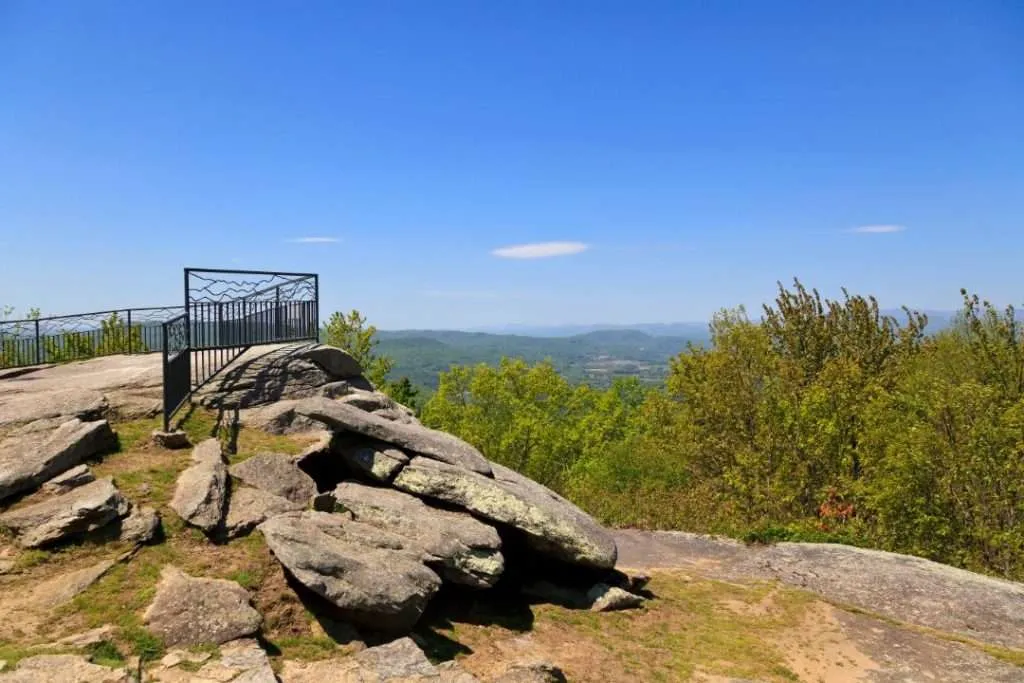
- Population: 15,321
- Percentage of Population 65+: 16.5%
- Cost of Living Rating: A
- Healthcare Rating: A
- Wellbeing Rating: A+
Hendersonville is often referred to as the “City of Four Seasons” due to its mild climate, which allows residents to enjoy a variety of outdoor activities year-round. Located in the scenic Blue Ridge Mountains, its geography includes the highest mountain in the county, Bearwallow Mountain, at 4,232 feet.
Known for its vibrant Main Street and historic downtown, Hendersonville provides a mix of cultural activities, shopping, and dining options. The city also has a strong sense of community, making it an ideal place for retirees looking for a small-town feel with big-city amenities. In fact, it was rated as the number one place to retire in NC in 2021 by Smartasset.
Wilmington: The Port City
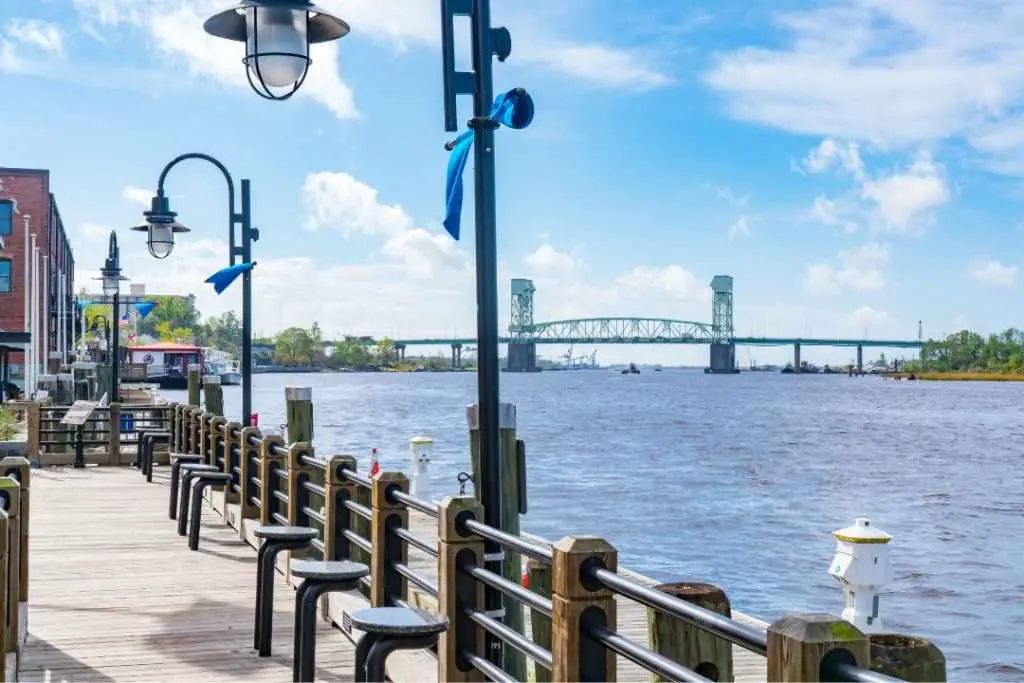
- Population:120,324
- Percentage of Population 65+: 16.5%
- Cost of Living Rating: A
- Healthcare Rating: A
- Wellbeing Rating: A
Wilmington offers colonial port town vibes, pristine beaches, and a youthful energy thanks to its student population. The city’s National Register Historic District spans over 230 blocks, featuring moss-draped live oaks, historic homes, and brick-lined streets. Wilmington is also home to the world-famous North Carolina Azalea Festival, which celebrates Southern culture and arts every April.
For those who love the outdoors, Wilmington provides a plethora of options. You can stroll along the pedestrian-friendly Riverwalk, lined with shops and cafes, or take a water taxi to the famous World War II Battleship NORTH CAROLINA. The city also offers beautiful island beaches with amazing outdoor activities from swimming to fishing and boating.
Wilmington isn’t just about history and outdoor activities; it’s also a hub for arts and culture. The city offers an array of festivals, museums, art galleries, and performing arts events. Whether you’re interested in music, history, or the great outdoors, Wilmington provides a vibrant and diverse environment that makes it a fantastic place to spend your retirement years.
Fayetteville: The All-American City
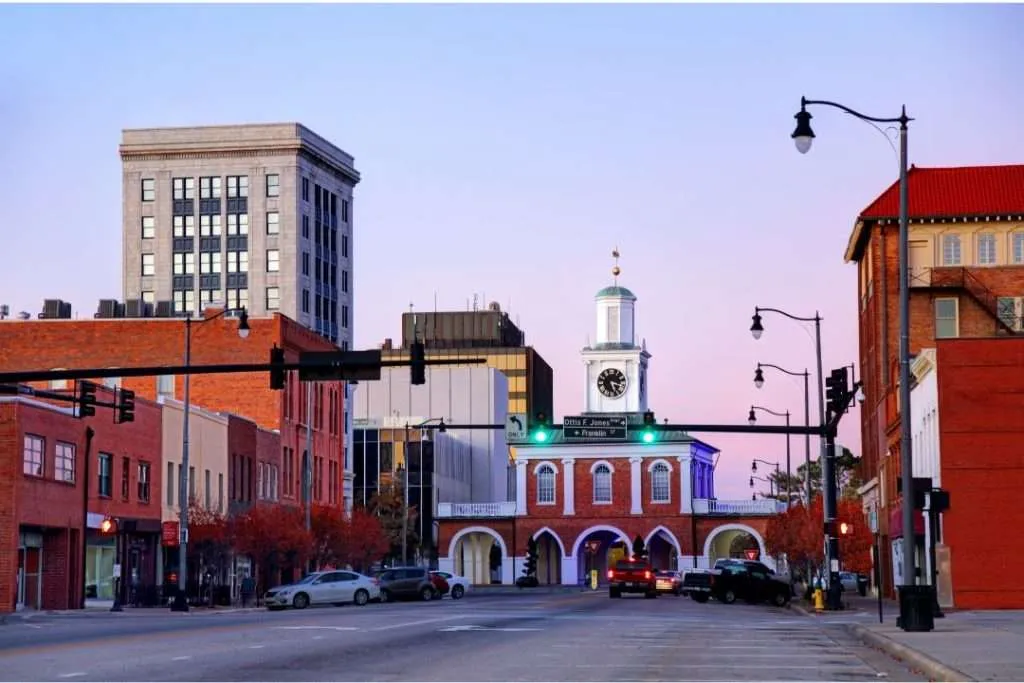
- Population: 208,873
- Percentage of Population 65+: 11.6%
- Cost of Living Rating: A+
- Healthcare Rating: A
- Wellbeing Rating: B+
Fayetteville is best known as the home of the U.S. Army installation, Fort Bragg. With a beautifully diverse culture and low cost of living, it’s a city that offers both excitement and affordability.
Fayetteville is surrounded by natural beauty, from the Cape Fear River that runs through the city to various parks like Carvers Creek State Park and Lake Rim Park. Whether you’re into kayaking, fishing, or simply enjoying a walk in the woods, the city offers a range of outdoor activities.
Fayetteville is also a city steeped in history. The city is home to several historic districts and museums like the US Army Airborne & Special Operations Museum, which offers a deep dive into military history.
For those interested in cultural heritage, Fayetteville has themed driving trails that explore various aspects of its rich history, including Civil War history and African-American Heritage.
Fayetteville hosts a variety of annual and seasonal events, from Farmers Markets to Minor League Baseball games to the spectacular Fayetteville Rose Garden. The city also offers a range of community programs, making it easy to get involved and stay active.
Chapel Hill: The Southern Part of Heaven
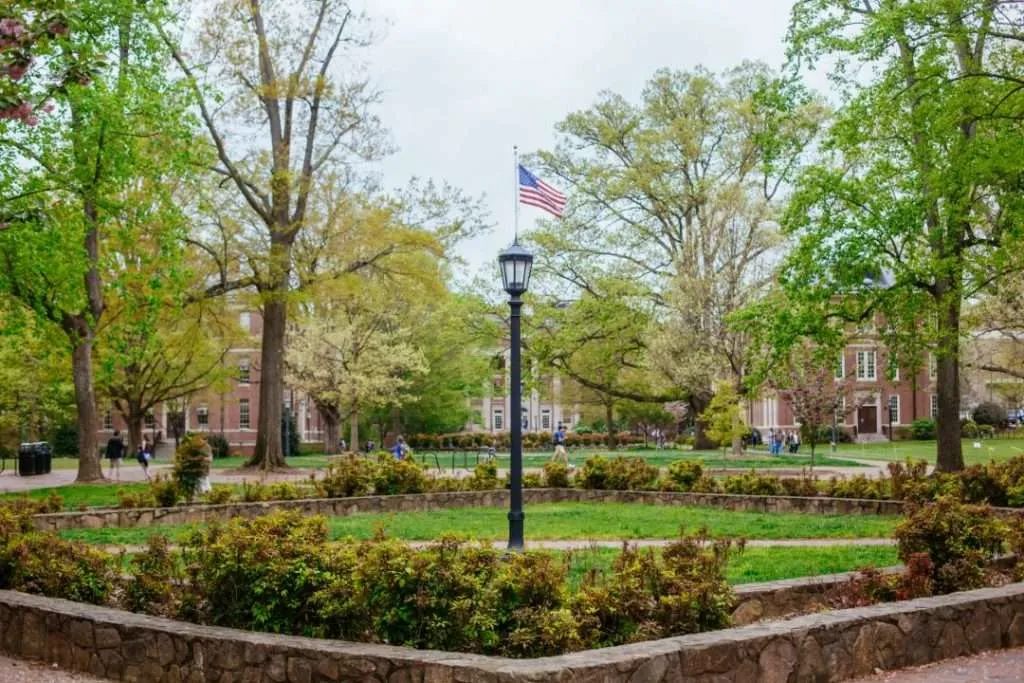
- Population: 62,098
- Percentage of Population 65+: 11.2%
- Cost of Living Rating: B
- Healthcare Rating: A+
- Wellbeing Rating: A+
Chapel Hill is a cultural haven, offering a plethora of activities for art lovers. The Ackland Art Museum is a must-visit, and the town is buzzing with visual and performing arts, especially around UNC-Chapel Hill (my alma mater – Go Heels!).
The town is surrounded by natural beauty, offering a range of outdoor activities. From the Coker Arboretum to the Botanical Garden featuring native plants and rotating art exhibits, nature lovers have plenty to explore. There are also various hiking trails like Johnston Mill Nature Preserve and Battle Park, perfect for those who love to stay active.
And, it’s not just a college town; it truly offers a sense of community with its small-town charm. Whether it’s the diverse food options like Med Deli on Franklin Street or the unique shopping experiences, there is something for everyone. And to top it off, It’s one of the safest places to live in North Carolina.
Raleigh: The City of Oaks
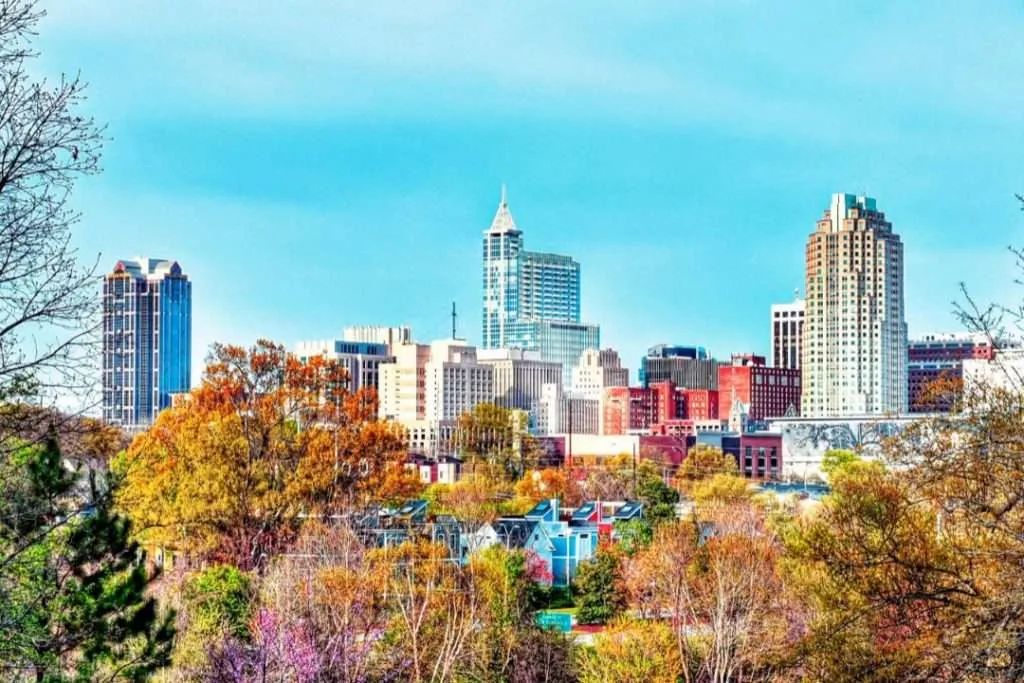
- Population: 476,587
- Percentage of Population 65+: 10.6%
- Cost of Living Rating: B+
- Healthcare Rating: A+
- Wellbeing Rating: A+
Raleigh, the state capital, is one of the fastest-growing cities in North Carolina. Filled with history, culture, and natural landscapes, Raleigh offers a high quality of life. The city is surrounded by nature, including lakes and hiking trails, making it a perfect destination for outdoor enthusiasts.
Known as the “Smithsonian of the South,” Raleigh boasts an array of museums and historic attractions. From the Museum of Natural Sciences to the Museum of Art, the city offers a plethora of educational and cultural activities. Many of these museums have free admission, making it an affordable option for retirees interested in lifelong learning and cultural enrichment.
Raleigh is also a city full of surprises. For instance, its Capitol Building was originally designed as a tomb, adding a layer of historical intrigue. The city is home to the Raleigh Beer Garden, which holds the world record for the most beers on tap; the James B. Hunt Library, one of the most advanced libraries in the world; and Pullen Park, one of the world’s oldest amusement parks.
Winston-Salem: The City of Arts and Innovation
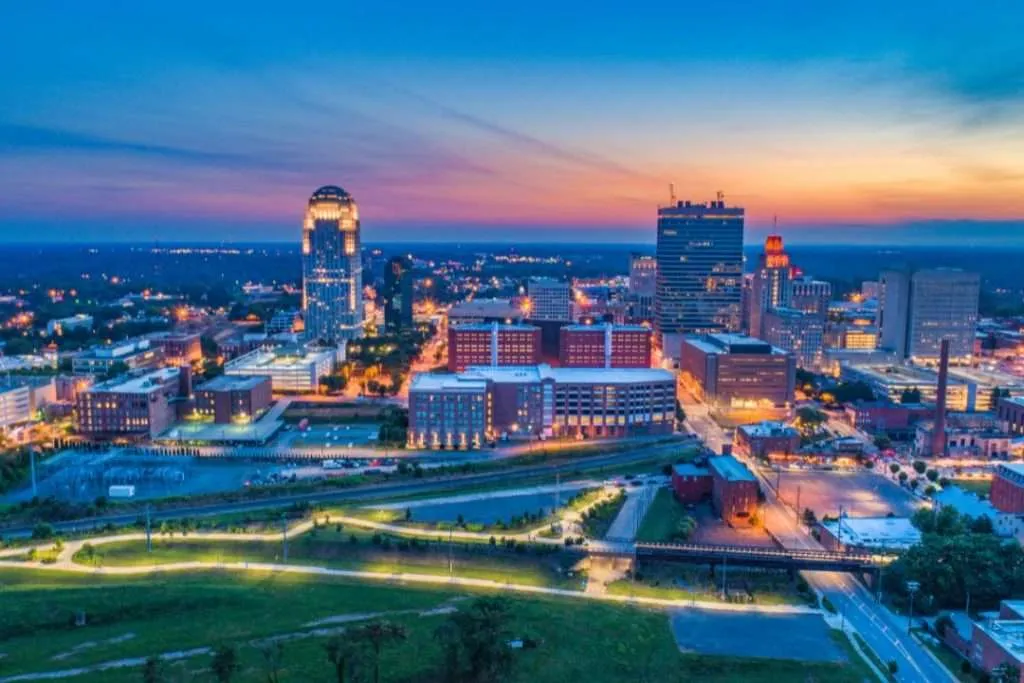
- Population: 251,350
- Percentage of Population 65+: 14.1%
- Cost of Living Rating: A+
- Healthcare Rating: A
- Wellbeing Rating: B+
Winston-Salem offers a thriving arts and culture scene, a reasonable cost of living, and all four seasons each year. It is a city that effortlessly blends the old with the new.
I appreciate the city’s rich history, which is evident in its well-preserved architecture and historic districts. But what really sets it apart is its vibrant arts scene; the city is home to numerous galleries, theaters, and museums that keep me engaged and inspired.
Hickory: The Furniture Capital
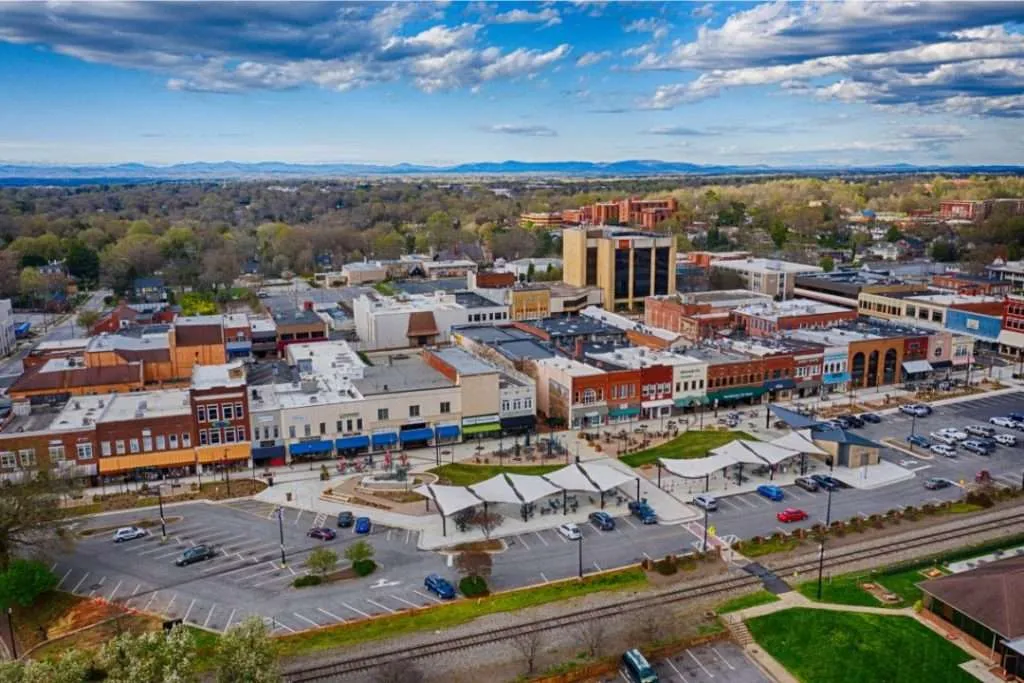
- Population: 44,084
- Percentage of Population 65+: 16.9%
- Cost of Living Rating: A
- Healthcare Rating: A
- Wellbeing Rating: B+
Hickory is a hidden gem in North Carolina that offers a peaceful, small-town atmosphere without sacrificing modern amenities. It also has amazing access to outdoor activities; the city is surrounded by beautiful mountains and lakes that are perfect for hiking, fishing, and boating.
Known for its strong artistic roots, it’s a city that appeals to both young professionals and retirees. Plus, the cost of living is affordable, making it easier to enjoy my golden years.
Greensboro: The Gate City
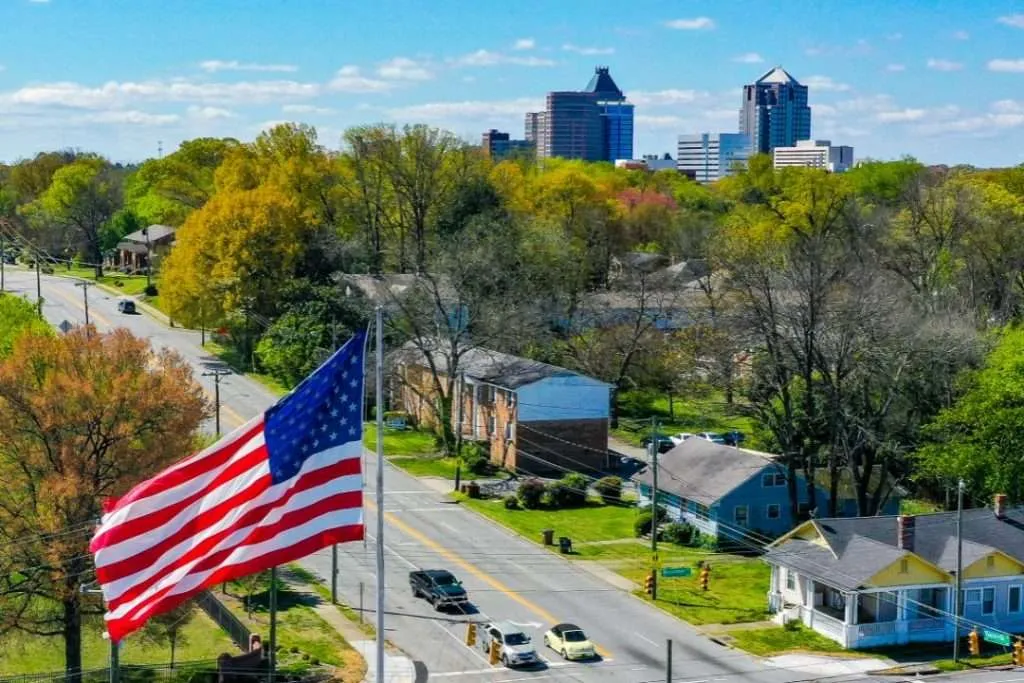
- Population: 301115
- Percentage of Population 65+: 13.7%
- Cost of Living Rating: A
- Healthcare Rating: A
- Wellbeing Rating: A+
Greensboro strikes the perfect balance between urban and suburban living. I’m particularly fond of the city’s extensive park system, which offers plenty of opportunities for walking, cycling, and picnicking.
The downtown area is bustling with shops, restaurants, and cultural venues, ensuring there’s always something to do. It is also home to UNC-Greensboro and several other colleges, which contribute to the arts scene in town and its vibrancy in general.
Cary: The Technology Town
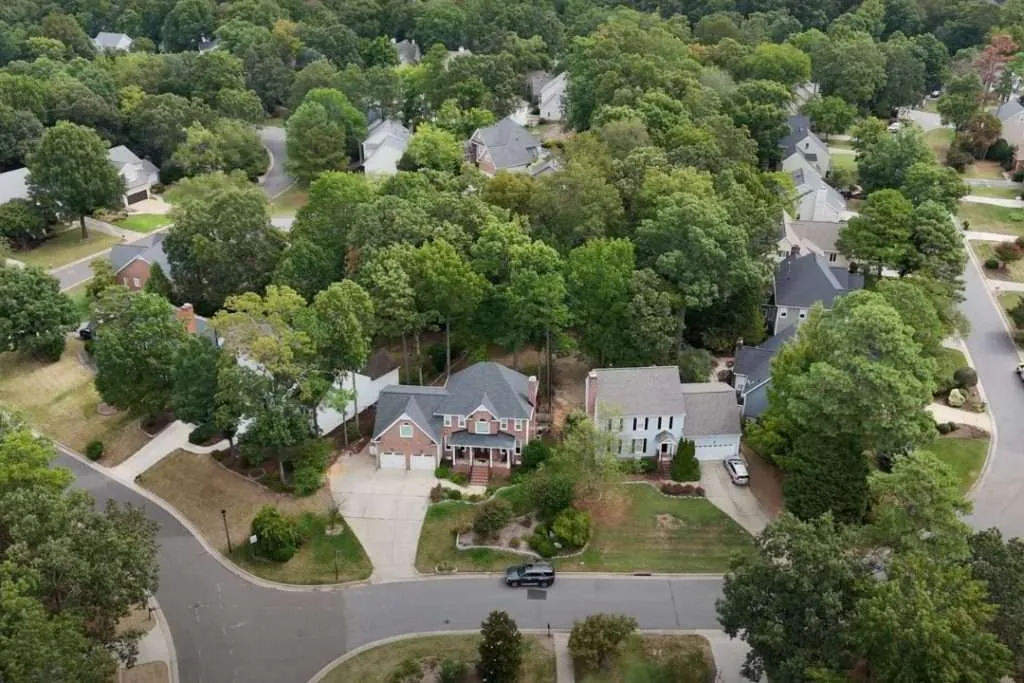
- Population: 180,388
- Percentage of Population 65+: 12.2%
- Cost of Living Rating: B
- Healthcare Rating: A+
- Wellbeing Rating: A+
Cary is known for its high quality of life and low crime rate. It’s a great place for those who are looking for a suburban feel with all the amenities of a big city.
Cary also offers top-notch healthcare facilities, which gives residents peace of mind as they age. What makes Cary unique is its focus on community; there are numerous community centers and programs specifically designed for seniors, making it easy to stay active and social.
Concord: Where Highways & Raceways Meet

- Population: 107,697
- Percentage of Population 65+: 12.3%
- Cost of Living Rating: A
- Healthcare Rating: A
- Wellbeing Rating: B+
Concord offers a mix of urban and rural living. Known for the Charlotte Motor Speedway, it’s a city that offers various recreational activities and a stable economy. But if racing isn’t your thing, the city also offers beautiful parks and a historic downtown area that’s perfect for leisurely strolls.
Gastonia: The City of Spindles
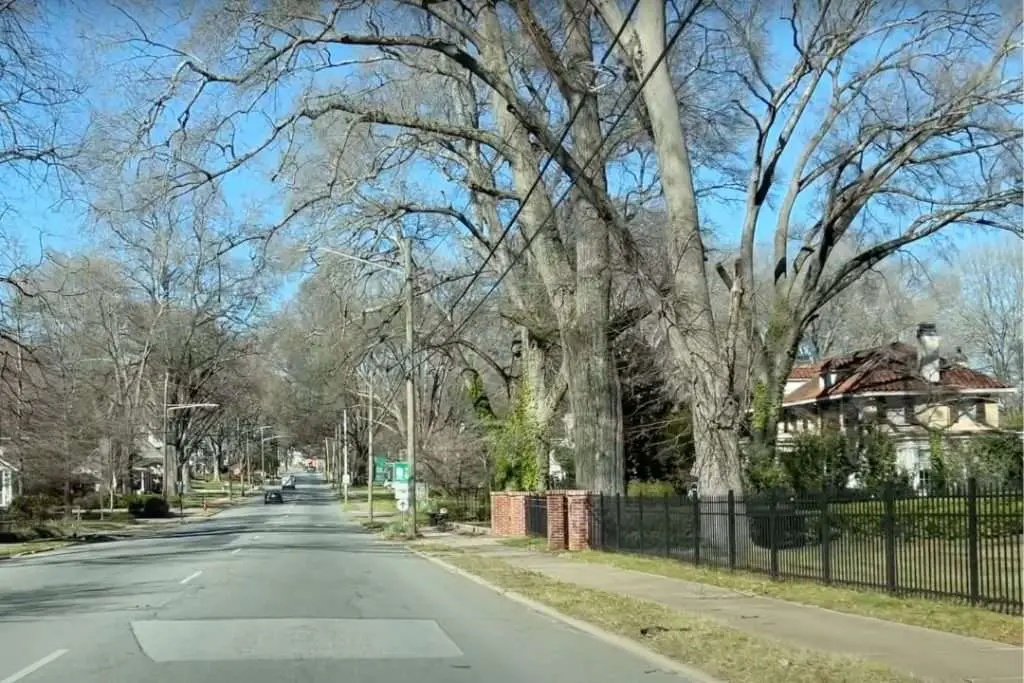
- Population: 81,161
- Percentage of Population 65+: 15.5%
- Cost of Living Rating: Low
- Healthcare Rating: Moderate
- Wellbeing Rating: Moderate
Gastonia offers a low cost of living and is close to Charlotte, providing easy access to big-city amenities while maintaining a small-town feel.
Gastonia is also perfect for retirees like me who love the great outdoors. The city is just a stone’s throw away from the stunning Crowders Mountain State Park, offering endless opportunities for hiking and bird-watching.
High Point: The Furniture Capital of the World
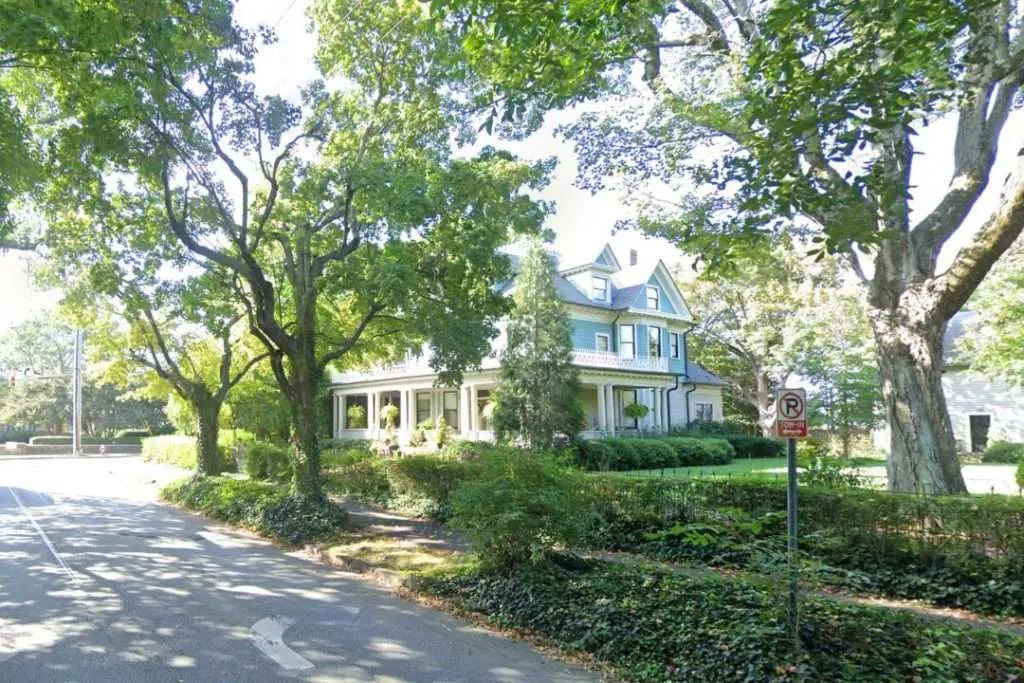
- Population: 114,086
- Percentage of Population 65+: 15.6%
- Cost of Living Rating: A
- Healthcare Rating: A
- Wellbeing Rating: B+
High Point offers a moderate cost of living and is known for its furniture manufacturing. It’s a city that provides a mix of urban and suburban living.
High Point is a haven for those who appreciate craftsmanship and design. It is fascinating to explore the numerous furniture outlets and antique shops that the city is famous for.
But it’s not just about furniture; High Point also offers a range of recreational activities. The city has beautiful parks like the High Point City Lake Park, where you can enjoy boating, fishing, or simply walking along the scenic trails.
Greenville: The Emerald City

- Population: 72,310
- Percentage of Population 65+: 14.4%
- Cost of Living Rating: A+
- Healthcare Rating: A
- Wellbeing Rating: B
Greenville offers a low cost of living and is known for its healthcare facilities, including the Vidant Medical Center. It is also a city that’s rich in culture and offers a high quality of life, making it an ideal place for retirement.
One of the things that stand out for me is the city’s commitment to the arts. The Greenville Museum of Art is a treasure trove of fascinating exhibits, and the local theaters frequently host performances that cater to a variety of tastes.
For those who enjoy outdoor activities, the Tar River provides excellent opportunities for kayaking and fishing. The city also has numerous parks and green spaces where I can enjoy a leisurely walk or a picnic.
How we determined the best places in North Carolina to retire
Overall, North Carolina offers a variety of options for those looking to retire. Whether you’re interested in a bustling city like Charlotte or a laid-back town like Wilmington, there’s something for everyone in the Tar Heel State.
When it comes to taxes, North Carolina, does not tax Social Security. However, unlike some of the retirement benefits in Virginia or South Carolina, income from a pension, 401(k), IRA or any other type of retirement account is all taxed at the North Carolina state income tax rate of 4.99%.
Some places in North Carolina are better for retirees than others. And we determined that by looking at a number of factors, such as residents 65 and older, crime rates, housing costs, access to healthcare, and wellbeing scores. Here’s how we scored the list and the data sources we used.
| Factor | Description | Data Source | Weight |
| Residents age 65 and older | Percentage of population age 65 and older | U.S. Census | 10% |
| Housing affordability | Comparison of average monthly housing costs to national average | U.S. Census | 10% |
| Access to Healthcare | Proximity and availability of top-quality health care providers | U.S. News Best Hospitals Rankings | 20% |
| Safety | Property and murder crime rates per 100,000 people | FBI Uniform Crime Reports | 20% |
| Weather | Average number of sunny days per year | Weather & Climate | 10% |
| Wellbeing | Annual ranking of happiness measures | Community Well-Being Index | 30% |

